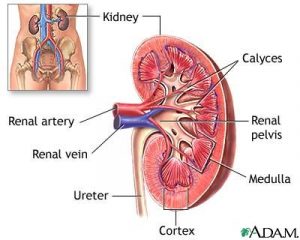Definition
Acute arterial occlusion of the kidney is a sudden, severe blockage of the artery that supplies blood to the kidney.
 Alternative Names
Alternative Names
Acute renal arterial thrombosis; Renal artery embolism; Acute renal artery occlusion; Embolism – renal artery
Causes
The kidneys are very sensitive to the amount of blood that flows through them. Any reduction of blood flow through the renal artery can impair kidney function. If prolonged, a complete blockage of blood flow to the kidney often results in permanent kidney failure.
Acute arterial occlusion of the kidney can occur after injury or trauma to the abdomen, side, or occasionally the back. Blood clots that travel through the bloodstream (emboli) can lodge in the renal artery.
The risk of emboli increases in people who have a history of certain heart disorders such as mitral stenosis or atrial fibrillation. Individuals with disorders that make them highly likely to form clots may be especially likely to develop acute renal artery occlusions.
Occasionally, renal artery stenosis can increase the risk of a sudden occlusion because a clot forms.
Symptoms
When one kidney doesn’t function, you may not have symptoms because the second kidney adequately filters the blood. Some people develop high blood pressure (hypertension), however.
If the other kidney is not functioning, blockage of the renal artery may cause symptoms of acute kidney failure:
- Abdominal pain
- Abrupt decrease in urine output
- Back pain
- Blood in the urine
- Flank pain or pain in the side
Note: There may be no pain. Pain, if it is present, usually develops suddenly.
Exams and Tests
The doctor will likely not be able to identify the problem by simply examining you, unless you’ve had the disorder long enough to cause kidney failure.
Tests include:
- MRI or renal scan shows lack of blood flow to the affected kidney
- Renal arteriography shows the exact location of the occlusion
Treatment
Often, patients need no specific treatment. Blood clots may get better on their own over time.
If the blockage is discovered within a few hours of its occurrence, or if the affected kidney is the only functional kidney, attempts may be made to open the artery.
Attempts to open the artery may include use of clot-dissolving medications (thrombolytics) and medications that prevent the blood from clotting (anticoagulants), such as Coumadin.
Some people may need to have the artery surgically repaired, or the blockage removed with a tube, called a catheter, inserted into the artery.
Treatment for acute kidney failure may be appropriate.
Outlook (Prognosis)
Damage caused by arterial occlusion may be temporary, but it is usually permanent.
If only one kidney is affected, the healthy kidney may take over filtering and urine production. In cases where there is only one functional kidney, arterial occlusion leads to acute kidney failure that often persists as chronic kidney failure.
Possible Complications
- Acute kidney failure
- Chronic kidney failure
- End-stage renal disease
- High blood pressure
- Malignant hypertension
- Renal artery stenosis
When to Contact a Medical Professional
Call your health care provider if you stop producing urine, or if you feel sudden, severe pain in the back, flank, or abdomen.
If you have only one functional kidney and you have symptoms of acute arterial occlusion, go to the emergency room or call the local emergency number, such as 911.
Prevention
In many cases the disorder is not preventable. The most important way to reduce your risk is to stop smoking.
Preventive use of anticoagulants may be recommended for people with a high risk of developing emboli, such as those with mitral stenosis, atrial fibrillation, or blood clotting disorders. Controlling diseases related to atherosclerosis (hardening of the arteries) may reduce your risk.
References
Kanso AA, Hassan NMA, Badr KF. Microvascular and macrovascular diseases of the kidney. In: Brenner BM, ed. Brenner and Rector’s The Kidney. 8th ed. Philadelphia, Pa; Saunders Elsevier; 2007: chap 32.
Reviewed By: Parul Patel, MD, Private Practice specializing in Nephrology and Kidney and Pancreas Transplantation, Affiliated with California Pacific Medical Center, Department of Transplantation, San Francisco, CA. Review provided by VeriMed Healthcare Network. Also reviewed by David Zieve, MD, MHA, Medical Director, A.D.A.M., Inc.
